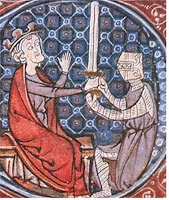While the characteristics of chivalry could vary somewhat depending on source, a consistent component was "nobility." Certainly in the later Middle Ages, it was increasingly difficult for a man of low station to achieve the status of a knight. Yet knighthood
was never confined exclusively to those of noble birth, and being of noble birth was always only part of
what medieval writers meant when saying a knight ought to be noble. In the 12 –
15th century it was most common for knighthood to be conferred for deeds of valor on the
battlefield or service to the king, and in Balian's age, where knighthood was still a comparatively new phenomenon and chivalry only starting to become the dominant ethic, a man could be raised up by any other
knight. In short, the virtue of nobility (as opposed to
the noble class) was something more ephemeral and ill-defined. It had to do with
living by a code of honor.
Did Balian d’Ibelin do that?
He certainly was not a Reynald de Chatillon, who broke treaties, or a Guy de Lusignan, who usurped a crown. His word was trusted or he would not have been able to act as an intermediary/emissary between warring factions, such as Raymond de Tripoli and Guy de Lusignan, or as an ambassador for both Conrad de Montferrat and Richard of England. From this we can infer that he commanded the respect of his contemporaries, including such men as Salah ad-Din and Richard the Lionhearted.
But perhaps the greatest evidence that he was considered “noble” by his contemporaries (and they are the only ones who can truly judge) is the fact that his reputation was so great that it conferred status on his sons and grandsons despite the fact that he was the holder of only a tiny -- indeed almost insignificant -- fief. There were many barons with greater wealth and more exalted titles, yet both Balian's sons served as regents, his grandson was made Count of Jaffa and Ascalon (traditionally the title of the heir to the throne) and historians have described his descendants as "semi-royal."
These honors were in part a function of family ties to the ruling houses of Jerusalem and Cyprus (through a step-daughter, Isabella, to the throne of Jerusalem and through a niece, Eschiva, to the throne of Cyprus). Yet it is noticeable that neither of these ties was so compelling that they need to have secured influence for generations. That the Ibelin family held an exceptional and exalted status among the theoretically equal barons of the Kingdoms of Jerusalem and Cyprus was, I believe, a reflection of the legacy of "nobility" left by the founder of the dynasty: Balian d'Ibelin.
He certainly was not a Reynald de Chatillon, who broke treaties, or a Guy de Lusignan, who usurped a crown. His word was trusted or he would not have been able to act as an intermediary/emissary between warring factions, such as Raymond de Tripoli and Guy de Lusignan, or as an ambassador for both Conrad de Montferrat and Richard of England. From this we can infer that he commanded the respect of his contemporaries, including such men as Salah ad-Din and Richard the Lionhearted.
But perhaps the greatest evidence that he was considered “noble” by his contemporaries (and they are the only ones who can truly judge) is the fact that his reputation was so great that it conferred status on his sons and grandsons despite the fact that he was the holder of only a tiny -- indeed almost insignificant -- fief. There were many barons with greater wealth and more exalted titles, yet both Balian's sons served as regents, his grandson was made Count of Jaffa and Ascalon (traditionally the title of the heir to the throne) and historians have described his descendants as "semi-royal."
These honors were in part a function of family ties to the ruling houses of Jerusalem and Cyprus (through a step-daughter, Isabella, to the throne of Jerusalem and through a niece, Eschiva, to the throne of Cyprus). Yet it is noticeable that neither of these ties was so compelling that they need to have secured influence for generations. That the Ibelin family held an exceptional and exalted status among the theoretically equal barons of the Kingdoms of Jerusalem and Cyprus was, I believe, a reflection of the legacy of "nobility" left by the founder of the dynasty: Balian d'Ibelin.





No comments:
Post a Comment